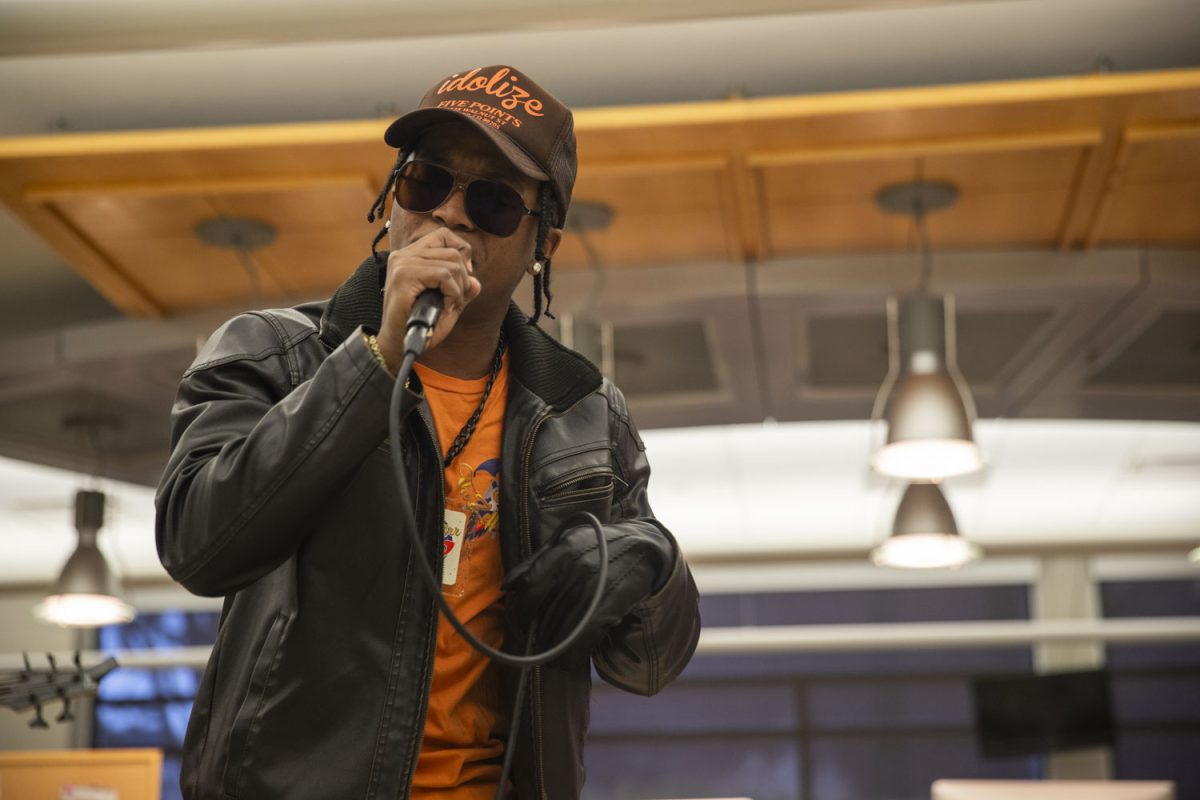Shonda Ryken was checking out, making friendly conversation with her cashier at the Coralville Costco, when she noticed his tattoo peeping out from under a sleeve.
“I just thought it was interesting that he was covering up his arm tattoos,” said Ryken, 49. “And frankly, I think he thought that I was upset because I could see them, so he went to cover it up.”
But it wasn’t an issue for Ryken, an Iowa City resident and mother of four, who said she sees tattoos frequently among the younger generation.
“I don’t think it’s offensive; I actually think it’s interesting,” she said. “It must be a self-expressive component of somebody’s personality.”
With so many people inking their bodies, local businesses are finding a variety of ways to deal with tattoos. Businesses’ approaches range from mandating employees to cover them up to celebrating their employees’ unique tattoos.
Coralville Costco’s warehouse manager David Pierce said the corporation’s tattoo policy requires employees to cover their body art.
“We try to cover them up. That’s our policy, period; we just try to cover them up,” Pierce said. “Our employees are very understanding.”
Other large business corporations, such as Hy-Vee, allow their individual branches to make their own employee tattoo policy, said Ruth Comer, assistant vice president of media relations for Hy-Vee.
“We don’t have a corporate policy on this,” she said. “So it will be up to each individual store.”
The store managers of the Waterfront and South First Avenue Hy-Vees in Iowa City declined to comment on their policies, and the North First Avenue’s store manager was unavailable for comment.
Tattoos are becoming so prevalent in American culture that 36 percent, or slightly more than one in three, of Americans 18 to 25 has at least one, according to Pew Research data.
Matthew Cooper, the owner of Nemesis Tattoo Studios, 385 E. College St., said he thinks tattoos are becoming more popular on college campuses and in workplaces.
“It’s definitely in the mainstream now,” Cooper said.
Cooper said tattoos began to develop mainstream popularity in the late-80s, when more options became available.
“[There were] better artists, better inks, higher quality tattoos,” Cooper said. “[It became] full custom instead of going in and being able to pick something off the wall, so there was more variety coming out.”
At Nemesis, the Tigerhawk surges in popularity for athletes and students, and custom designs of butterflies, flowers, poetry, and feathers that turn into birds have become common choices among the inked.
“We take any customer, but we won’t always do every tattoo,” Cooper said. “We want to give out a positive vibe here, so we won’t do basically negative tattoos, anything that’s got a negative reaction on us or the other person or society in general.”
With so many people getting tattooed, Cooper said believes it is only going to become more difficult for business owners to avoid hiring employees with tattoos.
“I don’t think many people really have a choice,” he said. “Sure, you can try to tell somebody that they can’t get a tattoo in the workplace or you don’t want to hire that person because tattooing still does have somewhat of a negative image to a lot of people. But people are getting them, and there’s no way around it. It’s going to happen.”
Several small businesses in Iowa City including the New Pioneer Food Co-op, Hamburg Inn, and G-Spot Hair Salon have adopted lenient tattoo policies.
At Hamburg Inn, tattooed employees are welcome and encouraged to express themselves through body art as long as they don’t carry offensive messages.
“We like our employees to be able to express themselves,” said Seth Dudley, a manager at Hamburg Inn. “That’s one of the ultimate forms of expression. It doesn’t get more permanent than that.”
He said he has never run into problems with customers being offended by employee tattoos.
“I think [customers] are more interested and want to know the story behind them or who did your work or stuff like that,” he said. “And, you know, it’s a good way for the customers to get to know their servers a little bit.”
Every employee in G-Spot Hair Salon has a tattoo of some sort, and many employees have full sleeve tattoos.
Hair stylist Jessie Jennings said she was unconcerned with the prospect of getting a job when she began getting tattoos that were visible.
“[It] didn’t even cross my mind,” she said. “I was 17.”
Jennings said she held a position at Dillard’s Department Store in Coral Ridge Mall before working at G-Spot, and even there, her tattoos were accepted.
“Working at a department store in the mall, I thought for sure they were going to have me cover my tattoos,” Jennings said.
The employees of G-Spot said that tattoos spark conversation with their customers and with people from all walks of life.
“Hopefully, it will just become more and more normal, and it won’t be an issue,” Jennings said. “Kids will become less surprised by it; it won’t be a big deal anymore, because it’s really not. We aren’t any different.”
As the popularity of body art soars, Cooper stresses to all potential tattoo customers the importance of researching tattoo parlors before committing to ink.
“If you see a tattoo that’s a nicely done tattoo, ask them where they got it; if you see a really bad tattoo, ask them where they got that,” Cooper said. “Check around. Go to the tattoo shops, check out the vibe in the shops, see if it’s comfortable to walk into, if it’s clean, if the people are nice and friendly.”
And health and safety cannot be stressed enough, he said.
“Safety is a big thing,” he said. “If you go into a shop, it’s going to be state licensed in Iowa, so it’s going to be health-inspected. If you go into a house it’s not — so, pretty easy way to get hepatitis or HIV.”
As for community members like Ryken, seeing tattoos in public will continue to be less and less surprising.
“We all self-express in many, many different ways, and I think tattoos are interesting,” she said.






